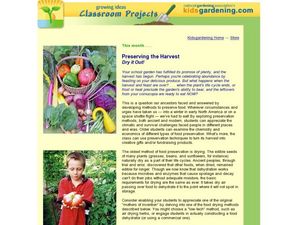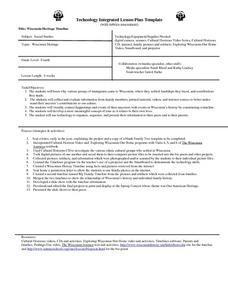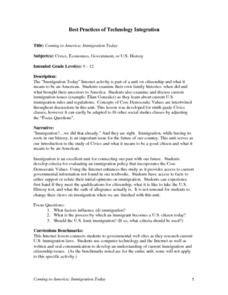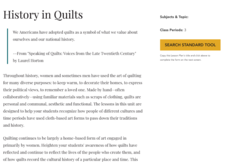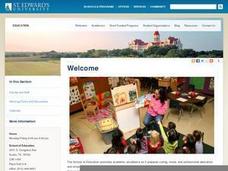California Academy of Science
Human Evolution
As the great and hilarious Tim Minchin once said, "Science is simply the word we use to describe a method of organizing our curiosity." Science is more than just a guess; it is based on questions, observations, and evidence. High...
Curated OER
Replacing Missing Links in the Evolutionary Chain
Examine the evolution of various species of hominids from their earliest existence approximately 4.5 million years ago to today. In small groups, learners research one of the ten stages of hominid evolution and then create a poster and...
Curated OER
My Family: Past, Present,
Second graders explore the lives of actual people who make a difference in their everyday lives. They differentiate between events that happened long ago and events that happened yesterday by studying their family histories. The unit...
Anti-Defamation League
What Is Culture?
Explore the complexity of culture with this rich and comprehensive lesson plan, which will prompt your learners to think critically and respectfully discuss our current definitions of culture, and how those definitions might...
Curated OER
In the Future we will all be Mixed Bloods and Mestizoes
Students examine the concept of origin and ethnicity. In this ethnic studies lesson, students engage in a variety of interdisciplinary activities including posters, and discussions to better understand our past and future.
Curated OER
Around the World in 180 Days
Where did I come from? How did I come to be in this classroom? Using curriculum from Kidspiration, class members research the homelands of their ancestors, as well as the journeys that began from many parts of the world and ended with...
Curated OER
Preserving the Harvest: Dry it Out!
Students explore how people preserved their food in the past. In food preservation lesson, students create different models that enable someone to dry out food, such as a food dehydrator. Students also learn how to...
Curated OER
American History: Finding your Voice
Young scholars are able to write a speech and create a slogan through analysis of current issues articles dealing with pesticide use. They put themselves in the position of one of the workers affected by the story they read.
Curated OER
Treaties
Fifth graders investigate Canadian history by examining the alliances made in the past. In this Canadian treaties lesson, 5th graders identify the Native Americans of Canada, known as the First Nations people or Aboriginals. Students...
Curated OER
Ellis Island Online
Students research their ancestors by visiting a number of online resources. They read personal immigration stories and begin creating their own family tree.
Curated OER
Wisconsin Heritage Timeline
Fourth graders explore why groups of immigrants settled in Wisconsin. Through intervies with family members, printed materials, and internet research, 4th graders discover the contributions early residents made to the state. Students...
Curated OER
Coming to America: Immigration Today
Young scholars research their own family histories and current U.S. immigration issues, rules, and regulations. They participate in a class discussion, watch a video about a Mexican immigrant's experience, and complete a WebQuest and a...
National Endowment for the Humanities
History in Quilts
Learners investigate the use of cloth-based art forms intended to pass down traditions and history. They research types of quilts, quilt characteristics and then identify how Freedom Quilts were historically used in the US.
National Museum of the American Indian
The Kwakwaka'Wakw: A Study of a North Pacific Coast People and the Potlatch
Discover the cultural practices and unique value systems of a group of native peoples from Canada called the Kwakwaka'wakw. Your young historians will discuss how conceptions of wealth can vary and how these native...
Curated OER
The Maya
Students demonstrate an understanding of the Mayan Culture. This is done by developing and answering questions about cultural traditions. They also label geographical regions on a map to incorporate Geography.






